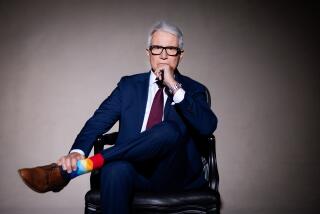San Francisco Public Defender Jeff Adachi, lauded as a champion of criminal justice reform, dies of heart attack at 59
- Share via
San Francisco Public Defender Jeff Adachi, hailed as a warrior for criminal justice reform, died Friday. He was 59 years old.
The mayor’s office released a statement that confirmed his death and praised Adachi as a champion “for those who didn’t have a voice.” He was credited with leading the way on reforms aimed at “reducing recidivism, ending cash bail and standing up for undocumented and unrepresented children.”
The circumstances of Adachi’s death were unclear. Local media reported that he died of a heart attack, citing unnamed sources.
In a statement Saturday, the public defender’s office said Adachi was out dining with a friend when he started having trouble breathing. He was taken to a hospital where he later died, according to the office.
Adachi stepped into the national spotlight when he oversaw the defense of a convicted felon in the country illegally and accused of murder in the shooting death of a woman walking on a San Francisco pier.
The shooting and the city’s sanctuary policy turned into a major campaign issue in multiple national and local races across the country. President Trump referred to the shooting repeatedly during his 2016 campaign to bolster his argument for tougher immigration policies and his opposition to sanctuary cities.
Jose Ines Garcia Zarate’s defense attorneys argued that the gun fired accidentally, ricocheted and killed the woman while she was standing with her father on the crowded pier. He was acquitted of the murder charge but found guilty of felony gun possession.
A 2010 profile in the San Francisco Chronicle highlighted Adachi’s fight to have city employees pay more toward their pensions, a ballot proposition that was fiercely opposed by labor unions and unsupported by any elected city official, except Adachi.
The article painted Adachi as independent-minded and passionate about injustice and oppression. He said then that one of his most his most vivid childhood memories was learning about the internment of Japanese Americans in camps during World War II. His own parents, grandparents and great-grandparents had all been interned, according to the newspaper.
“It caused me to question all the things I had been told about justice for all,” he said.
Colleagues said he brought that dedication to social justice to the public defender’s office, where he started working in 1987. He went on to be elected public defender five times.
Deputy Public Defender Niki Solis called him “one of the most compassionate, fierce, fearless, dedicated agents for social change this city has ever seen.”
Asian Law Caucus executive director Aarti Kohli said Adachi had “a selflessness and zeal that are exceedingly rare in this world” and vowed to “continue fiercely advocating against the criminalization of vulnerable community members in his honor.”
In a letter to The Times that he wrote last year, Adachi took umbrage with an editorial arguing that Los Angeles doesn’t need an elected public defender because they represent their clients, not “the people,” and because the city isn’t as liberal as San Francisco, where voters “are at least as vested in who represents criminal defendants as who prosecutes them.”
“Public defenders may not represent The People, but we stand up for real people every day,” Adachi wrote. “Elected public defenders, unencumbered by pleasing a mayor or Board of Supervisors, become watchdogs against police and prosecutorial misconduct and reformers of the justice system, ensuring it works equally for everyone.”
More to Read
Sign up for Essential California
The most important California stories and recommendations in your inbox every morning.
You may occasionally receive promotional content from the Los Angeles Times.











